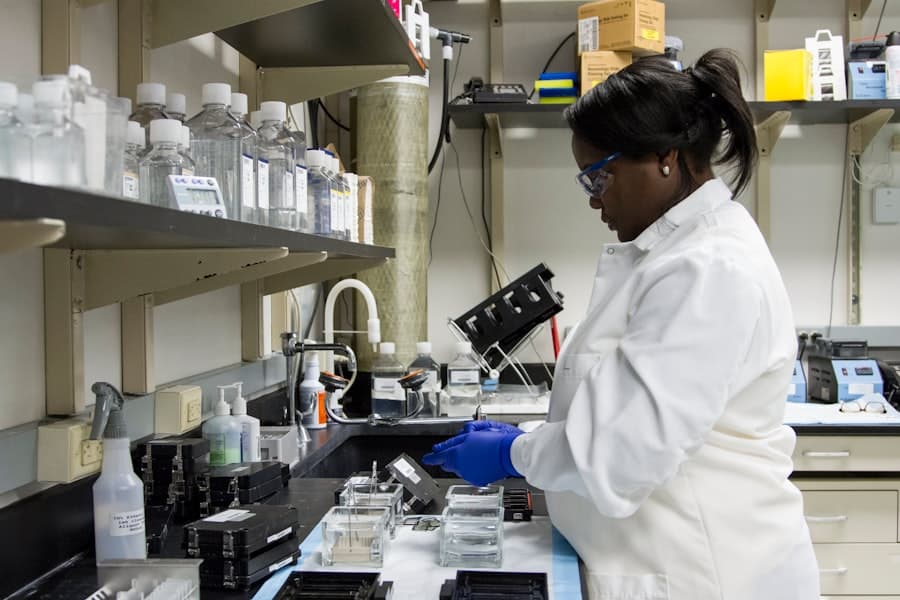Artificial Intelligence (AI) has revolutionized numerous industries, and the job application process is no exception. The integration of AI into resume and cover letter optimization has transformed how candidates present themselves to potential employers. At its core, AI assists job seekers in crafting documents that not only highlight their skills and experiences but also align with the specific requirements of job postings.
This alignment is crucial, as many companies utilize Applicant Tracking Systems (ATS) to filter resumes before they even reach human eyes. By leveraging AI, candidates can ensure that their applications are tailored to meet these automated screening processes, increasing their chances of being noticed. Moreover, AI tools analyze vast amounts of data to identify trends in successful resumes and cover letters.
They can provide insights into what hiring managers are looking for, including preferred formats, common keywords, and effective phrasing. This data-driven approach allows candidates to create documents that resonate with employers, enhancing their overall appeal. For instance, an AI tool might suggest that a particular industry favors action-oriented language or specific qualifications, enabling candidates to adjust their narratives accordingly.
As a result, understanding the role of AI in this context is essential for job seekers aiming to stand out in a competitive job market.
Key Takeaways
- AI can help optimize resumes and cover letters by formatting, structuring, customizing content, and keyword optimization.
- Choosing the right AI tool is crucial for effective resume and cover letter optimization.
- AI can assist in formatting and structuring resumes and cover letters to meet industry standards and best practices.
- Customizing content with AI can help tailor resumes and cover letters to specific job requirements and company culture.
- Leveraging AI for keyword optimization can improve the chances of getting noticed by applicant tracking systems and hiring managers.
Choosing the Right AI Tool for Resume and Cover Letter Optimization
Selecting the appropriate AI tool for optimizing resumes and cover letters is a critical step in the job application process. With a plethora of options available, candidates must consider several factors to ensure they choose a tool that meets their specific needs. One of the primary considerations is the tool’s ability to analyze job descriptions and provide tailored recommendations.
Some AI platforms excel in parsing job postings and identifying key skills and qualifications that should be emphasized in a candidate’s application. For example, tools like Jobscan allow users to compare their resumes against job descriptions, highlighting areas for improvement and suggesting relevant keywords. Another important aspect to consider is user-friendliness.
A tool that is intuitive and easy to navigate can significantly enhance the user experience, allowing candidates to focus on crafting compelling content rather than grappling with complex software. Additionally, candidates should look for tools that offer comprehensive features, such as formatting assistance, content suggestions, and grammar checks. Platforms like Zety and ResumeGenius not only help with content optimization but also provide templates that adhere to industry standards, ensuring that resumes are visually appealing and professionally formatted.
Formatting and Structuring Your Resume and Cover Letter with AI

The formatting and structure of a resume and cover letter play a pivotal role in how information is presented to potential employers. AI tools can assist candidates in creating documents that are not only aesthetically pleasing but also strategically organized to highlight key information effectively. For instance, many AI-driven platforms offer customizable templates that adhere to best practices in resume design.
These templates often include sections for contact information, work experience, education, and skills, ensuring that all relevant details are easily accessible. In addition to providing templates, AI tools can suggest optimal layouts based on industry standards. For example, a candidate applying for a creative position may benefit from a more visually dynamic format, while someone seeking a role in finance might opt for a more traditional layout.
This might include suggestions for bullet points over lengthy paragraphs or the strategic placement of key achievements to draw attention to them immediately. By utilizing AI for formatting and structuring, candidates can create polished documents that effectively communicate their qualifications.
Customizing Your Resume and Cover Letter Content with AI
Customization is a critical element of effective resume and cover letter writing. Generic applications often fail to capture the attention of hiring managers, making it essential for candidates to tailor their content to each specific job opportunity. AI tools can facilitate this process by providing insights into how best to align personal experiences with the requirements outlined in job descriptions.
For instance, an AI tool might analyze a job posting for a marketing position and suggest that the candidate emphasize their experience with digital marketing strategies or social media campaigns. Moreover, AI can assist in generating personalized content that reflects the candidate’s unique voice while still adhering to professional standards. This balance is crucial; while it’s important to showcase individuality, it’s equally vital to maintain a level of professionalism that resonates with employers.
Some advanced AI platforms even offer features that allow users to input their career goals or specific achievements, which the tool can then weave into the narrative of the resume or cover letter. This level of customization not only enhances the relevance of the application but also demonstrates a genuine interest in the position.
Leveraging AI for Keyword Optimization in Your Resume and Cover Letter
Keyword optimization is an essential strategy for ensuring that resumes and cover letters pass through ATS filters successfully. Many companies utilize these systems to screen applications based on specific keywords related to skills, qualifications, and experiences relevant to the job. AI tools can analyze job descriptions to identify these critical keywords and phrases, allowing candidates to incorporate them strategically into their documents.
For example, if a job posting emphasizes “project management” and “team leadership,” an AI tool can highlight these terms as essential components for inclusion in the candidate’s resume. In addition to identifying keywords, AI can also suggest variations or synonyms that may enhance the document’s overall effectiveness. This is particularly useful in industries where jargon or specific terminology is prevalent.
By using an AI tool to optimize keyword usage, candidates can ensure that their applications are not only ATS-friendly but also resonate with hiring managers who may be scanning for particular competencies or experiences. This dual focus on both technology and human review increases the likelihood of making it through initial screenings and landing an interview.
Using AI for Grammar and Spelling Checks in Your Resume and Cover Letter

The importance of impeccable grammar and spelling in resumes and cover letters cannot be overstated; errors in these documents can create a negative impression on potential employers. AI-powered grammar checkers have become invaluable tools for candidates seeking to polish their applications before submission. These tools go beyond basic spell-check functions by analyzing sentence structure, punctuation usage, and overall clarity of expression.
For instance, platforms like Grammarly offer real-time feedback on writing quality, suggesting improvements that enhance readability and professionalism. Additionally, some AI tools provide context-specific suggestions that help candidates avoid common pitfalls associated with resume writing. For example, they may flag overly complex sentences or recommend simpler alternatives that convey the same message more effectively.
This level of scrutiny ensures that candidates present themselves in the best possible light while minimizing the risk of miscommunication due to grammatical errors.
Incorporating AI-Generated Insights and Suggestions into Your Resume and Cover Letter
AI-generated insights can significantly enhance the quality of resumes and cover letters by providing data-driven recommendations tailored to individual candidates’ experiences and aspirations. Many advanced AI tools analyze successful applications within specific industries or roles, offering insights into what makes certain documents stand out. For example, an AI tool might reveal that successful applicants for software engineering positions frequently highlight collaborative projects or specific programming languages.
Candidates can then incorporate these insights into their own documents to better align with industry expectations. Furthermore, AI can suggest improvements based on real-time feedback from hiring trends and employer preferences. This dynamic approach allows candidates to stay current with evolving standards in resume writing and presentation.
For instance, if recent data indicates a growing emphasis on remote work experience due to shifts in workplace dynamics, an AI tool could prompt candidates to highlight relevant experiences accordingly. By integrating these insights into their applications, candidates not only enhance their chances of catching an employer’s eye but also demonstrate adaptability—an increasingly important trait in today’s job market.
Measuring the Impact of AI-Optimized Resume and Cover Letter on Job Applications
Once candidates have utilized AI tools to optimize their resumes and cover letters, it becomes essential to measure the impact of these enhancements on their job application success rates. Tracking metrics such as interview invitations received or responses from hiring managers can provide valuable insights into how well the optimized documents perform compared to previous versions. Candidates may find it beneficial to maintain a record of applications submitted before and after implementing AI-driven changes, allowing them to assess any noticeable differences in outcomes.
Additionally, feedback from interviews can serve as another metric for evaluating the effectiveness of AI-optimized applications. If candidates notice an increase in positive feedback regarding their qualifications or presentation during interviews following the use of AI tools, this could indicate that their optimized documents are resonating more effectively with employers. Furthermore, engaging with peers or mentors who have experience in hiring can provide qualitative insights into how well their applications are perceived within industry contexts.
By systematically measuring these impacts, candidates can refine their approach over time, continually leveraging AI advancements to enhance their job search strategies.
If you are interested in utilizing technology to enhance your job search, you may also want to check out this article on the best free software for voice recording. Voice recording can be a useful tool for creating personalized audio cover letters or practicing your interview responses. Additionally, if you are in need of a new device to support your job search efforts, you may find this article on choosing the right iPhone in 2023 helpful. Having a reliable smartphone can streamline your job search process and keep you organized. And for those who enjoy gaming as a way to relax and unwind during the job search process, this article on the best laptops for gaming may be of interest to you. Investing in a quality gaming laptop can also double as a powerful tool for job searching and networking.
FAQs
What is AI resume and cover letter optimization?
AI resume and cover letter optimization is the process of using artificial intelligence technology to analyze and improve the content of a resume and cover letter to increase the chances of getting noticed by employers and landing a job interview.
How does AI help in optimizing resumes and cover letters?
AI helps in optimizing resumes and cover letters by using natural language processing and machine learning algorithms to identify and suggest improvements in the content, formatting, and keywords used in the documents. It can also provide insights on how to tailor the content to specific job descriptions and industries.
What are the benefits of using AI for resume and cover letter optimization?
Some benefits of using AI for resume and cover letter optimization include increased chances of getting noticed by employers, improved alignment with job requirements, and saving time and effort in the job application process. AI can also provide personalized feedback and suggestions for improvement.
Are there any potential drawbacks of using AI for resume and cover letter optimization?
Potential drawbacks of using AI for resume and cover letter optimization include the risk of over-reliance on technology, the possibility of overlooking important human elements in the application process, and concerns about privacy and data security when using AI-powered platforms.
What are some popular AI tools for resume and cover letter optimization?
Some popular AI tools for resume and cover letter optimization include Jobscan, VMock, RezScore, and Zety. These tools use AI algorithms to analyze and provide feedback on the content, formatting, and keywords used in resumes and cover letters.

